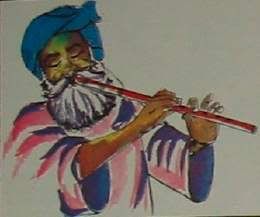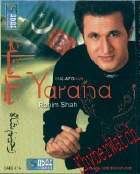Adil Najam
 It is both sad and surprising that the NWFP gets such little credit for its cultural and intellectual contributions to contemporary Pakistan despite the immense impact that artists and intellectuals from the NWFP have had.
It is both sad and surprising that the NWFP gets such little credit for its cultural and intellectual contributions to contemporary Pakistan despite the immense impact that artists and intellectuals from the NWFP have had.
Of course, the Frontier is not the only part of the country whose contributions get drowned out amidst the (sometimes self-c ongratulatory) discourse about Lahore, Karachi and (more recently) Islamabad [as someone who grew up in all three of these wonderful cities – enough, in fact, to consider myself a proud native of all three – I hope I can say this without sounding accusatory]. These cities (especially the first two) have always attracted great talent from elsewhere in the country. They have had the generosity of heart to not only welcome but to embrace all comers; so much so that the new comers become natives and are seen as such.
ongratulatory) discourse about Lahore, Karachi and (more recently) Islamabad [as someone who grew up in all three of these wonderful cities – enough, in fact, to consider myself a proud native of all three – I hope I can say this without sounding accusatory]. These cities (especially the first two) have always attracted great talent from elsewhere in the country. They have had the generosity of heart to not only welcome but to embrace all comers; so much so that the new comers become natives and are seen as such.
My point is not to undermine the importance of the more visible centers of artistic and intellectual life, but to express a concern that those who live outside of NWFP can sometimes tend to ignore its contributions.
I hope that our readers will add to this list, but let me name just a few luminaries that come immediately to mind:
- Amongst poets, one of the pre-eminent living Urdu poets – possibly the pre-eminent living Urdu poet – Ahmad Faraz, a Pushto-speaking Pathan, born in Nowshera, studied in Peshawar.
- Amongst prose writers, the legendary Urdu essayist Syed Ahmed Shah Patras Bokhari — and his brother Zulfiqar Bokhari, an equally legendary broadcaster renowned for his Urdu recitation of verse and prose — were both from Peshawar.
- Amongst dramatic actors the soil of the frontier has been amazingly rich. Both Dilip Kumar and Raj Kapoor were born in Peshawar. Qavi and Firdous Jamal – two of the top dramatic actors on Pakistan Television – were also both raised in Peshawar.
- Amongst comedians, filmstar Rangeela, may have made his name in Punjabi slapstick but was born Saeed Khan in Afghanistan and grew up in Peshawar.
That, of course, is just a sampling. One day I hope we will do proper posts on Peshawar and its intellectual and cultural contributions. Right now, I just wanted to get this point off my chest by way of introducing a wonderful music video from Pushto pop music sensation, Rahim Shah.
Long-time readers would remember that we did a short post on Rahim Shah in early July (here), which features a hilarious video where someone had dubbed a Rahim Shah song onto a Michael Jackson video (here). if you have not seen it, I would recommend doing so. After looking at the video, do listen to the song without looking at the video… it is catchy and you can see why Rahim Shah has become such a Pushto pop phenomenon.
 He is, in fact, part of a minor revolution going on in Pakistan in pop-music in regional languages. Rahim Shah is the central figure in Pushto pop music today and also has a number of hits in Urdu, especially including Jhoola. In fact, he has been singing also in Punjabi and Sindhi and his Punjabi song Tairay ishq nay has also done very well.
He is, in fact, part of a minor revolution going on in Pakistan in pop-music in regional languages. Rahim Shah is the central figure in Pushto pop music today and also has a number of hits in Urdu, especially including Jhoola. In fact, he has been singing also in Punjabi and Sindhi and his Punjabi song Tairay ishq nay has also done very well.
A colleague working in Kabul tells me that he is an equally big sensation across the border in Afghanistan. This particular video is a good reason why. I have been mesmerized by the music and video for the last many weeks. You do not need to know the exact words to understand the meaning; it is a classical tale of love. I beleive it is in Dari (or is it Farsi?). The words should mostly be familiar not just to Pushto-speakers but also those who understand any Persian. The theme should be familiar to everyone everywhere. Enjoy:
Especially given the headlines of the last many weeks, this song is also politically poignant. It is a love story of a Pakistani man and an Afghan woman. See especially the last scene with the exchange of flags. The Pak-Afghan theme is a common focus in a bunch of Rahim Shah songs. I hope this his people-to-people music diplomacy turns out to be more successful than efforts (or lack thereof) from official channels on the two sides.



















































Salamoona
Saida Khan, if he was really your grandfather, than you most know that Rahman Baba is not a Pakistani. Did you got any information about Rahman Baba in schools in Panjab or Sindh..? I don’t think so. Rahman Baba is a Afghan/Pakhtun/Pashtun/Pathan from Afghania/Pakhtunkhwa/Pakhtunistan.
Read a little bit about your history, your culture, your ethnicity, your origin, your language, your country etc.
What have we Pakhuns the same with Panjabis and Sindhis…?
* Language..? No, we have totally different languages
* Culture..? No, we have totally different languages
* Ethnicity..? No, they are Panjabis and Sindhis and we are Afghans/Pakhtuns/Pashtuns/Pathans
* History…? No, they lived in India and we lived in Historicull land Ariana and Present day Afghanistan.
* Origin..? No, they are Indic and we are Arians.
We have nothing the same, Except they are our Muslim brothers.
The provinces Baloochistan and Pakhtunkhwa are the land of Afghans, which was let for 100 years to Britisch India. This 100 years are finished in 1993, So we Afghans/Pakhtuns/Pashtuns/Pathans want our country back! We are not begging anyone because, It is our right and no one can take our rights from us!
The border between Afghanistan and Britisch Indian was the Abasin river (also know as Indus river). So the border of Afghanistan and present day Pakistan was Abasin river, it most be the border and it will be the border of Afghanistan and present day Pakistan, Inshallah.
You and Me, is We, and we are Pakhtuns and like Khushal Baba (Khushal Khan Khattak) saids;
* Afghani/Pakhto/Pashto,
Da Afghan pa nang me watarrla tura, nanagyalai da zamane Khushal Khattak yem.
*English,
I have taken up the sword to defend the pride of the Afghan, I am Khushal Khattak, the honorable man of the age.
His second poet;
*English,
Pull out your sword and slay any one, that says Pakhtun and Afghan are not one!
Arabs know this and so do Romans: Afghans are Pashtuns, Pashtuns are Afghans!
Don’t be foolish with your nonsens of Pakistan, even in Pakistan you are called Afghan. Pakistan means, Which is actually Pakstan means, P=Panjab, A=Afghanistan (Pakhtunkhwa), K=Kasmir, S=Sindh and TAN=Baloochistan.
I hope you refresh your mind, read a little bit about your identity!
You can find me on Wikipedia in two languages;
* English
http://en.wikipedia.org/wiki/User:Tofaan
* Dutch/Nederlands/Hollands
http://nl.wikipedia.org/wiki/Gebruiker:Abasin
On Afghanbuddies
* http://www.AfghanBuddies.com/AsheQ
And PP2G
* http://Abasin.pp2g.com
Take care, Abasin
Interesting post. I came across this blog by accident, amazing accident.
But I will not appreciate each and every thing.
Here are somethings on which I disagree. Any way best as compare to others…
english to urdu translation
Khushal Khan Khattak was born at Akora Khattak district Nowshera in 1613. He was an intelligent and bold person from childhood. His father Shahbaz Khan was killed in a tribal clash on 4th January, 1641. Mughal Emperor Shahjehan was the ruler of India during that period. Shahjehan had great regard for Khushal Khan Khattak due to the guts that he possessed. Khushal Khan Khattak was the ally of Mughals during many adventures and was awarded a Jagir and Lakhs of rupees.
The distances between the Aurangzeb Allamgir and Khushal Khan Khattak increased due to some misunderstandings and the latter was not remained a favorable person near the former personality.
Mahabat Khan who was the governor of Peshawar had tried to keep the relation between Khushal Khan Khattak and Aurangzeb Alamgir and was successful to a great extent. After Mahabat Khan, Syed Amir Khan was appointed as governor Peshawar then the tension increased between Khushal Khan Khattak and Syed Amir Khan, as a result Khushal Khan Khattak was arrested and put behind the bars. Khushal Khan Khattak was later on released and returned to homeland in 1668, but the relations between government and him remained tense. He was a good poet and religious scholar.
He is also called with the name of Baba-e-Pushto. His poetry consists of more than 45,000 poems. According to some historians the number of books written by him is more than 200. But the books, which enjoyed more fame, are Baz Nama, Fazal Nama, Distar Nama and Farrah Nama. The Mazar of Khushal Khan Khattak is situated near the Railway Station of Akora Khattak in Nowshera district.
Awesome! I love this post
Sadia, with due appology but it’s such a shame that we don’t even the basics of history. You are assuming with a conviction that Rahman Baba (RA) was a Pakistani; can you please tell us in which era did Rahman Baba (RA) live and when was Pakistan “created” (by the British Imperialists)?
Regards.